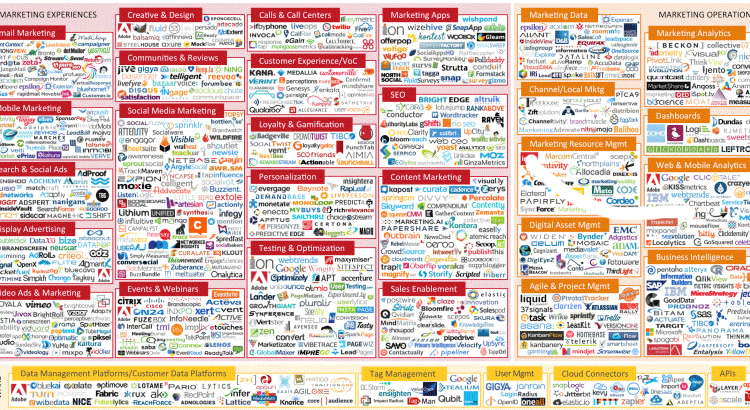Martech
Martech is the blending of marketing and technology that is exploding across the marketing world, across adland, across PR – basically every discipline associated with the getting and keeping of customers.
All of us dealing in digital marketing are dealing with martech, since digital by its very nature is technologically-based. Scott Brinker’s Marketing Technology Landscape supergraphic shows the rate at which the marketing technology industry (martech) is expanding, with 1876 companies in 43 categories. Martech is arguably the most dynamic and high-growth in technology today. Even the historically CIO focused Larry Ellison, Founder of Oracle, is keen to win over marketing: “The CMO’s role is going to be more important next year than it is this year, and more important the year after that” (Ad Age).
I recently talked to a bunch of MSc and some clever folks at a MeetUp in Dublin about the topic. I called it ‘#martech. What it’s like to be the eye of the storm?’ and it gave me cause to think a little bit more about my own experiences and how they can be relevant to readers. In the last year, the number of calls from martech has risen from a trickle to a tsunami. 5+ calls a day from vendors wishing to deal directly with me, and pretty much asking for a PO on the call, or at best, demanding a 1 hour webex with somebody higher up in their organisation who is NOT on the call.
What’s going on?
Acquiring, converting and retaining the new, digital customer is marketing’s responsibility. It’s not tasked to sales or IT, but to the Marketing Director. Today’s marketer has many more channels to choose from, access to unprecedented amounts of data and a wealth of insights available if they engage with marketing technology.
We can think of three drivers for this:
Technically: A set of technology that applies to major initiatives, efforts and tools that harness technology to achieve marketing goals and objectives.
Analytically: The creativity and storytelling that is often associated with advertising and marketing are no longer the only skills needed to succeed. Software, models and algorithms that reveal the interests, values of actions of individuals and groups are now the key.
What is actually interesting to a marketer……….
Strategically:
Why is this an emerging trend?
- Life is MORE digital
- Marketing culture has changed
- Marketing budgets are under pressure
- M+A and VC Investments are through the roof….
Marketing Directors are now choosing and monitoring software as well as managing teams. This is a significant change. Indeed, you could argue that specialised technology solutions could replace the plethora of brand managers and assistant brand managers
What to do?
Given the flurry of phone calls, requests for pitches and clamour for the marketer’s time, where should the senior marketer start?
Think ‘internal’ and ‘external’.
You need to have thought through what you really need for the business. This is obvious, but it means you can save lots of personal time on useless calls. Unless you have a real need for a new email client, you don’t have to take their calls. Knowing what you want becomes a time saving and temper saving mechanism.
Here are the internal questions that you must think through:
- How will we use this technology to improve our business?
- Which capabilities are must-haves for us? What can we survive without?
- Who are the users of this technology?
- Do these users perceive a need for the new software and are they capable of taking on a new tool?
- Do we have people in the company who can analyse and correctly interpret the data?
- Are we currently using other systems that need to integrate with our existing technology?
- Or are we currently using several smaller tools that can be consolidated into a new platform? If so, what happens to that existing data?
- How will we know that we’ve adopted the right technology? How will we measure success?
Here are the external questions to you need to ask of the vendor. You might not ask them all at once, but they should become your permanent frame of reference running through your mind all the time
Here are the external questions:
- What makes your technology technically unique from others? What is your USP?
- Can this be explained succinctly and with numbers rather than generically?
- Is this a SAAS model, or software installed in the business?
- What kind of training and support is included? Does the technology require lots of professional services?
- What is the set-up cost? Monthly / yearly and total cost of ownership
- What is the size of organisation this software is tailored for?
- Do they understand our business? Do they have staff who have worked in our industry?
- Is there a specific example of the product ‘live’ and in action to demonstrate how the tool works in OUR industry?
- Do they understand that technology is a tool to solve problems, not the solution itself?
- Other reference sites in our industry
- Product roadmap for the next year




